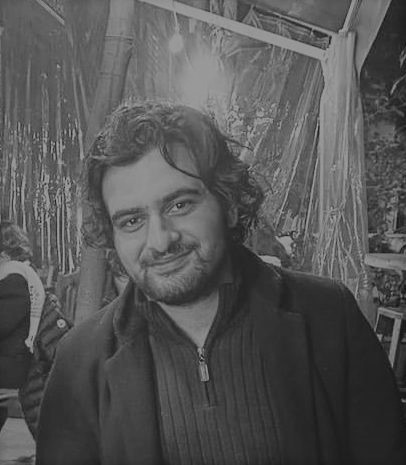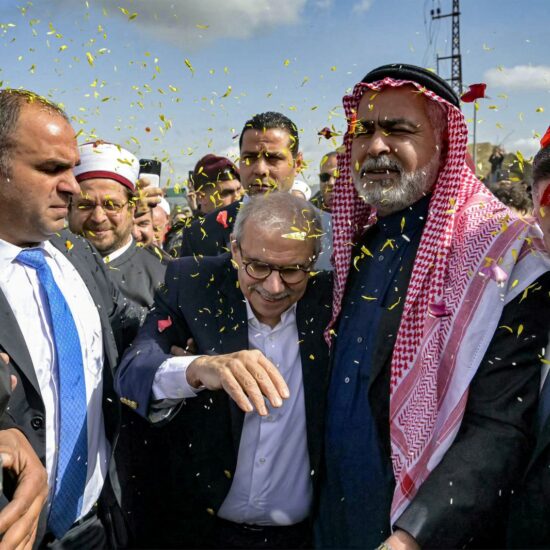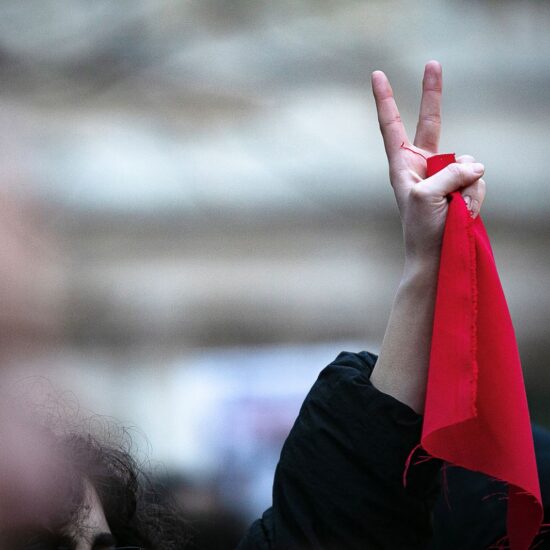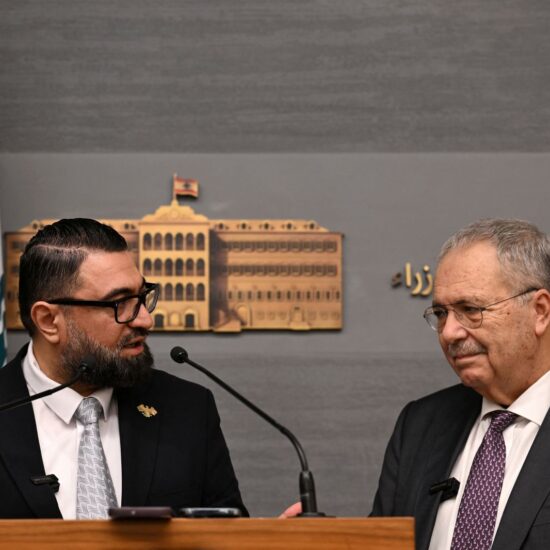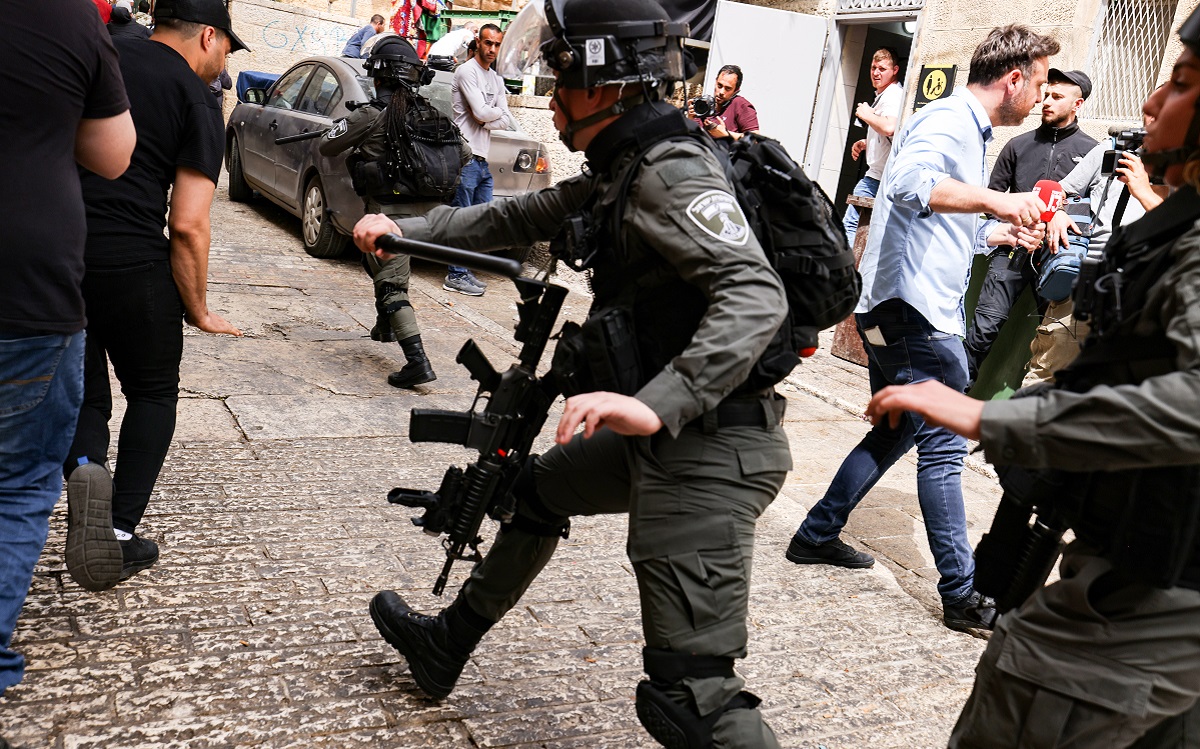
The Holy month of Ramadan is observed by Muslims all over the world with fasting, prayer, and giving back to the community.
In the Jerusalemite context, the jovial nature of the month of Ramadan is contested. The month is rendered a period of worry and fear, as every year, prayers in the Al Aqsa Mosque are interrupted by Israeli security forces raids and escalating settler violence.
On April 16, the Israeli police raided the morning prayer at the mosque in search of stones some Palestinian participants at the gathering were allegedly planning to throw at the troops.
The plaza outside the Damascus gate is engraved in the Palestinians’ consciousness, most notably during Ramadan. The plaza, a popular spot for Jerusalem’s Palestinians, also represents the only public space in East Jerusalem. The holy site has borne witness to regular police crackdowns, troubling the people’s cultural and social gatherings.
Factoring in the tensions deriving from the surge in settler violence, this year has been significantly bloody. By April 2022, Euro-Med Monitor documented the killing of 47 Palestinians by Israeli forces. This figure, alone, is five times higher than the fatalities that had occurred in the same time span by the spring of 2021.
On the Israeli side, the past weeks have been riddled with a tragic turn of events. At the end of March, three attacks in one week by radical Palestinian assailants claimed the lives of 10 people.
On March 22, four Israelis were killed and two others wounded in an attack next to a shopping center in the southern city of Beer Sheva. The perpetrator rammed the victims with his car, and proceeded to stab the individuals until he was apprehended and killed by surrounding civilians. The perpetrator was identified as Mohammad Ghaleb Abu al-Qi’an, a convict from the Negev. Abu al-Qi’an had been previously sentenced to prison for plotting to join the Islamic State terror group in neighboring Syria.
Five days later, two Israeli Arabs opened fire at a bus stop in the northern city of Hadera, killing two 19-year-old police officers. IS said it was behind that attack. The assailants were shot dead. In a third attack, a Palestinian armed with an M-16 shot 5 people, including two Ukrainians, in the Bnei Brak suburb of Tel Aviv.
On April 7, in Tel Aviv, a resident of the occupied West Bank city of Jenin, Ra’ad Hazem, opened fire on Dizengoff street, a popular nightclub neighborhood in the city. He killed three people and wounded twelve more before being apprehended by Israeli security forces in Jaffa.
The attack in the heart of the city brought considerable disruption to the Israeli context. Amplified security measures were taken by the Israeli police. Fear has always been prevalent during the holidays.
The calendar of violence
Despite the perceived scarcity of interfaith relations between Jews and Muslims, they share many religious and cultural traditions. These commonalities include a wide range of aspects that constitute dietary restrictions, prayer schedules, religious practices, and stories. Furthermore, what they also share in common is a similar process of measuring time.
According to Islamic tradition, keeping time corresponds to observing the change in the moon’s monthly cycles. As such, Muslims have been counting the months and years via the specific lunar calendar system of Hijri, beginning from the time of the “Migration” of the Prophet Mohammad.
The Hebrew calendar, which serves as the official calendar for religious Jewish observation within the State of Israel, is lunisolar. It shares with the Muslim calendar its Lunar system for counting months, while having solar years. This distinction means that different religious celebrations of the two faiths intersect every few years, many times with tragic consequences.
Ramadan coincided with Yom Kippur in 1973, when the war broke out between Israel and its neighboring Arab states.
The year 2022 carries the same type of coincidence. This month of April holds both the Jewish holiday of Passover or Pesach, which celebrates the exodus of the Israelites from slavery in Egypt, as well as the Muslim Holy month of Ramadan.
At the moment, this permutation of lunar and solar events is noticeably menacing in the Holy Land. With tensions at an all-time high, the lives of Palestinians and Israelis are still dictated by a conflict whose perpetuity has rendered it habitual.
Every year, it starts and ends in the same way, a spiral of violence and escalation. One Palestinian perpetrates an attack against Israelis and what ensues is an Israeli crackdown on Palestinian civil liberties which, in turn incites more attacks.
Following the attacks in recent weeks, Israeli security forces raided the Al Aqsa mosque and arrested hundreds of Palestinians. Tensions continued during the Christian Easter weekend. Early on Tuesday Morning, Israel carried out its first airstrikes on the Gaza Strip in months in response to a rocket fired from the Hamas ruled territory.
Lessons of the past
Are we doomed to relive this cycle of violence every few months? Is Palestinian welfare doomed to succumb to the mistakes of the past? Should the Palestinian cause be manifested through scenes of random violence? Is the scene of bloodshed incessant? Can a reinvented Palestinian cause prove remunerative compared to the misgivings of former escalations?
Violence leads to more violence, and it is especially the case in the Israel-Palestine context.
The events that will ensue after these weeks of terrorism and bloodshed will be, au fond, considerable for the Palestinians.
It would be noteworthy to remember a not-so-distant past in the conflict’s history and learn from its lessons. Back in the 1990s, when the peace process was ongoing, attacks on civilians erupted, disrupting any form of popular support among Jewish Israelis for such a process.
In 1996, right before the Israeli Defense Force’s withdrawal from the last Israeli-controlled town of Hebron in the West Bank, one of the deadliest series of attacks in the history of the conflict took place. These attacks dealt a massive blow to the Palestinian crouch for Statehood and are engraved in Israeli consciousness.
That year saw a series of deadly attacks claimed by Hamas which targeted public buses in Israel, killing more than 50 Israeli citizens. On March 3, after another attack claimed the lives of 20 people, the current member of Knesset, Palestinian leftist politician Ahmed Tibi woke up Yasser Arafat on the news of the attack.
In 1996, right before the Israeli Defense Force’s withdrawal from the last Israeli-controlled town of Hebron in the West Bank, one of the deadliest series of attacks in the history of the conflict took place. These attacks dealt a massive blow to the Palestinian crouch for Statehood and are engraved in Israeli consciousness.
“When I woke up Arafat and told him about the bombing, he was silent for a few seconds and then said angrily: ‘This is a disaster, a disaster,” Tibi told the LA Times.
The bus attacks erupted in a coordinated manner in different parts of Israel. Subsequently, Prime Minister Shimon Peres ordered the temporary halt of the Peace Talks with the Palestinians and a delay of the withdrawal from Hebron ensued.
Deadly, but ineffective
Random attacks on civilians have long been insignificant in advancing the Palestinian cause. Israeli police have only augmented their presence in East Jerusalem and the West Bank over the years, restricting the freedoms of the Palestinians and violently cracking down on any form of dissent.
These scattered attacks on civilians will not bring about the liberation of Palestine, on the contrary. Today we are witnessing collective punishment in Jenin, the resident town of the Dizengoff Street attacker. Tensions have risen sharply between Israel and the Palestinians in recent weeks against the backdrop of repeated attacks in Israeli cities that left 14 people dead.
Anyone who suggests these attacks may be in any way profitable for the Palestinian people is, at best, uncommitted. The attacks committed by Hamas in the 1990s were massively damaging to the peace talks back then (which were widely supported by the Palestinians), and are ultimately one of the reasons why Israeli politics have shifted to the right.
We are at a time when popular nonviolent action is the only appropriate course of action.
The affiliations of the people who committed the attacks ought to worry the people who care about Palestine. It is quite challenging to see how the Islamic Jihad and the Islamic State share the concerns of the Palestinians. How can Palestine be envisioned through the scope of the Palestinian national aspirations if these groups are celebrated?
We are at a time when popular nonviolent action is the only appropriate course of action.
Today, the Israeli public is patently disillusioned with “peace”. The previous “Land for Peace” rhetoric, by which the Israeli government would offer land in the pursuit of attaining peace with its neighbors, has been ever-so unpopular.
The previous head of the settler Yesha Council, Naftali Bennet, leads the country.
The Israeli occupation is an ugly one. Ending it is necessary for concluding the conflict. But liberation will not happen by terrorizing the lives of civilians in residential and commercial areas. The Palestinian political landscape is at a constant threat of being a fertile ground for terrorist organizations. Understanding Israeli politics is crucial in comprehending this predicament.
The month of Ramadan is not yet over and the perpetual atmosphere of despair is ever-more prevalent for anyone concerned with Palestinian well-being.
Mohamad A. Hamdan is a writer and an I/P commentator. He tweets at @modbeirut.
The opinions expressed are those of the author only and do not necessarily reflect the views of NOW.


